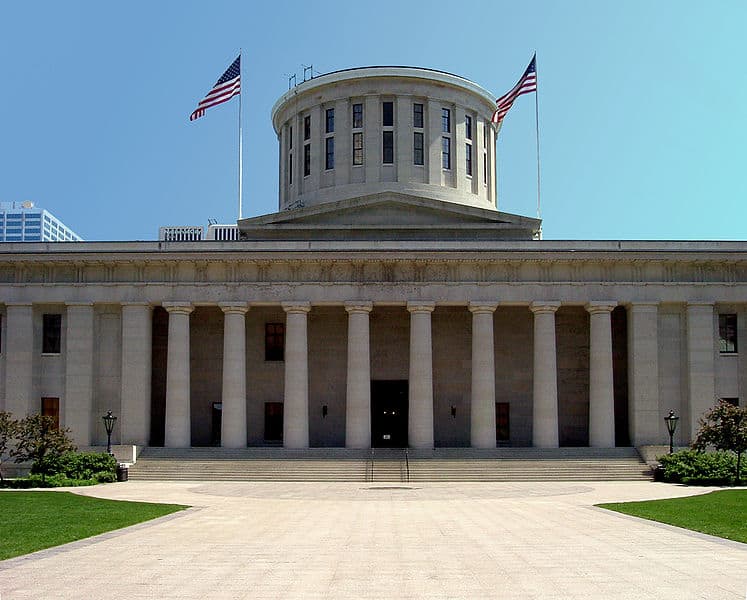Ohio bill would bar utilities from charging customers for politics

Ohio lawmakers have introduced a bill that would make it illegal for electric and gas utilities in the state to charge their customers for political influence activities. The bill would also introduce new transparency measures designed to prevent utilities from secretly spending huge sums of money on politics, a response to FirstEnergy’s spending $60 million in dark money as part of a bribery scheme that led to the conviction of the state’s speaker of the House earlier this year.
Sen. Kent Smith, the Ranking Member on the Ohio Senate Public Utilities Committee and Minority Whip for Democrats, introduced the legislation, Senate Bill 149, on Tuesday.
Smith introduced the bill as part of a raft of utility reform legislation. In addition to SB 149, SB 151 is a bipartisan bill that would finally repeal a ratepayer bailout for coal plants owned by AEP, AES, and Duke Energy included in H.B. 6, the now-infamous 2019 law that resulted from the utility corruption scheme.
Another bill from Smith, Senate Bill 150, would bar utilities from disconnecting any customers with children under the age of five in the household for non-payment.
SB 149 is the latest in a growing trend of efforts around the country to protect customers from footing the bill for their utilities’ political influence activities. Like the Ohio bill, Colorado, Connecticut, and Maine all passed laws this year which prohibit utilities from charging customers for lobbying, trade association memberships, charitable contributions, advertising, and campaign contributions. Three Democratic members of Congress also introduced the Ethics in Energy Act earlier this summer, which would similarly ban utilities from charging customers for political activities in rates approved by the Federal Energy Regulatory Commission (FERC). Like those other laws, the Ohio bill would not stop utilities from spending on political activities, but it would bar them from baking those expenses into customers’ rates, instead forcing them to draw from profits that they return to shareholders.
Like the new laws adopted by other states, the Ohio bill would require utilities to file itemized annual reports documenting their political influence spending; the Ohio legislation goes a step further by introducing a robust penalty regime for utilities that break the new rules. Any utility caught improperly charging customers for political activities would have to pay a fine amounting to a minimum of 20 times the charges, in addition to refunding the money with interest. The fine would go into a “political activity fine fund” and be disbursed to low- and moderate-income Ohio customers to help them pay their bills.
Legislation comes in response to ratepayer-subsidized scandals
The Ohio bill comes three years after the arrest of then-Ohio House Speaker Larry Householder. Householder was convicted earlier this year in a racketeering case involving $60 million in bribes paid by the utility FirstEnergy in exchange for ratepayer-funded bailouts included in Ohio’s House Bill 6. A network of 501(c)(4) groups with names like Generation Now and Partners for Progress helped to conceal the FirstEnergy money that enabled the scheme.
H.B. 6 included a now-repealed $1.3 billion ratepayer bailout for nuclear and coal plants then owned by a bankrupt FirstEnergy subsidiary. The 2019 Ohio law also included another now-repealed provision that guaranteed FirstEnergy’s Ohio utilities hundreds of millions of dollars in unearned revenue at ratepayers’ expense. Other parts of the bribery-tainted 2019 Ohio law still remain in effect today, including a rollback of state renewable energy and energy efficiency standards for electric utilities that was long sought by FirstEnergy, and the coal plant bailout benefiting other utilities like AEP, AES and Duke Energy.
Reporting by the Energy and Policy Institute and audits and investigations by state regulators have documented how FirstEnergy charged ratepayers, not only in Ohio but in other states including Maryland, New Jersey, Pennsylvania and West Virginia, for a host of the expenses related to its bribes and other campaigning for HB 6, as well as other expenses tied to the utility’s broader political advocacy.
- A 2021 audit by the Public Utilities Commission of Ohio (PUCO) recommended $6.6 million in refunds to customers of FirstEnergy’s Ohio utilities who were wrongly charged for payments related to the H.B.6 scandal (a second PUCO audit and several cases related to FirstEnergy’s H.B. 6 political spending have been paused by PUCO at the request of federal prosecutors while the utility corruption investigation continues).
- A 2022 Pennsylvania Public Utilities Commission audit found that FirstEnergy’s Pennsylvania utilities owed at least $2.4 million in refunds to customers that the utilities charged for H.B. 6-related payments.
- Following an audit by the New Jersey Bureau of Public Utilities, FirstEnergy is proposing to refund approximately $10 million to New Jersey customers who it wrongly charged for lobbying, advertising, sponsorships and other expenses, while also proposing to raise those customers’ rates by $185 million.
- After another state investigation led by the Maryland Office of the People’s Counsel, FirstEnergy’s Maryland utility proposed to refund nearly $1.7 million to Maryland customers who were charged for lobbying, advertising, and sponsorships, as part of a proposal to raise rates by $44 million.
- A West Virginia Public Service Commission audit into FirstEnergy’s use of ratepayer money for lobbying is just now getting underway. Ahead of that audit, FirstEnergy proposed to refund $2.5 million to customers of the company’s West Virginia utilities who were wrongly charged for “non-recoverable costs,” which included sports sponsorships, as part a proposal to raise those same customers rates by $207 million
The Federal Energy Regulatory Commission also fined FirstEnergy nearly $4 million for failing to disclose lobbying expenditures during a federal audit that ultimately found tens of millions of dollars in undisclosed political spending, after FirstEnergy finally admitted to the spending. FirstEnergy’s lawyers have fought to withhold key details about the bribery scheme during the audits and investigations launched by state regulators.
In addition to FirstEnergy, the utility AEP paid $8.7 million to a dark money group, Empowering Ohio’s Economy, that funneled $1.4 million into Householder’s network of 501(c)(4)s, but state and federal utility regulators have done nothing publicly to investigate whether AEP used ratepayer money for those payments.
Had the transparency measures proposed in the new legislation been in place in the years leading up to H.B. 6, they likely would have made it harder for FirstEnergy and AEP to spend secretly on their political efforts surrounding HB 6.
The PUCO could undertake many of the regulatory changes and transparency measures proposed in Sen. Smith’s legislation voluntarily. The Louisiana Public Service Commission opened a docket earlier this summer to explore similar actions. But when asked by reporters whether it would consider new rules or transparency-related reforms to prevent another utility corruption scandal, the PUCO has avoided commenting.
SB 150 would protect families with young children, elderly from disconnection
SB 150 would prohibit Ohio’s utilities from disconnecting electricity to households for nonpayment if the household has a child that is five or younger or a person who is 65 or older living there.
The bill would also protect people with a disability, an illness, or a pregnancy from being disconnected for non-payment if they provide proof of those conditions.
Utilities also could not disconnect customers who are at or below 200% of the federal poverty line for non-payment, assuming they provide proof of income. Instead, those customers would be enrolled in a payment program requiring them to make monthly payments of an amount that’s less than either 7.5% of the customer’s monthly income, or one-twelfth their combined gas and electric bills from the period immediately before they enrolled in the payment plan, whichever amount is lower.
The legislation would prohibit utilities from passing costs of those protections onto other ratepayers.
Existing annual reporting in Ohio has shown that the state’s utilities typically disconnect households from electricity for non-payment hundreds of thousands of times per year, with the overall number of disconnections often hovering between 250,000 and 300,000 annually between 2013 and 2021.
AEP has by far disconnected the greatest number of Ohio families for non-payment, with over 155,398 disconnections from June 2022 through this past May, according to the company’s annual filing to the PUCO.
FirstEnergy’s three Ohio utilities (Cleveland Electric, Ohio Edison, and Toledo Edison) disconnected power a combined 76,811 times over the same period, according to its filing.
Duke Energy disconnected power 23,059 times over that period.
Utility disconnections don’t affect all communities in Ohio unevenly, with Black families and other racial and ethnic minorities bearing the greatest burden in Ohio, as research has shown is the case nationally.
SB 150 would require utilities to add zip code data to their current annual reporting of disconnection data to the PUCO, and to increase the frequency of the reports from quarterly to monthly. That more granular data could help regulators, legislators and the public better understand racial disparities embedded in utility disconnections and help better target resources for relief. PUCO rejected consumer advocacy groups’ requests for zip code data in 2021.



